Meet the facilitators
We have a network of dedicated individuals all over the UK who travel to the various locations where our Live your Life workshops take place. Without them volunteering their time, invaluable knowledge and first hand experience of lymphoma, none of the workshops would be possible. Here are the facilitators who make it all possible.
Sandra Holstead
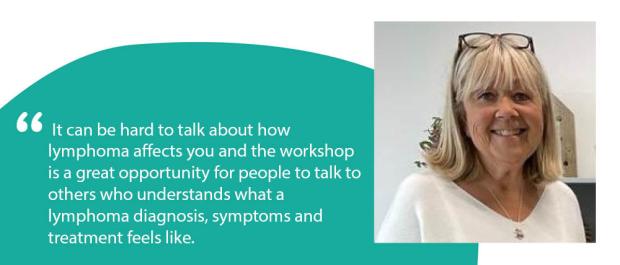
My name is Sandra Holstead. I was diagnosed with non-Hodgkin lymphoma Waldenström’s macroglobulinaemia (WM) in 2010. I stayed on active monitoring (watch and wait) for 6 years but then started chemo in 2016. I reached partial remission after 8 cycles of RCP but am now back on treatment with Ibrutinib after relapsing in 2018. I feel really well and have already achieved a better result than I did following chemo!
During my time of active monitoring and treatment I was really well supported by Lymphoma Action and knew that I would like to give something back. I had attended an end of chemo course at my local hospital but felt that it would be really beneficial to have something specifically for lymphoma patients. I was delighted to be able to become a facilitator for the Live your Life programme.
I consider it a real privilege to be a small part of lymphoma patients’ stories. It is immensely rewarding during the workshops to see a real bond and support network begin between people who hadn’t met until the start of the workshop. It’s a great opportunity for people to talk to others who have been through something similar and understand what lymphoma diagnosis, symptoms and treatment feels like. It can be hard to talk about how lymphoma affects you and the workshops provide a safe, supportive environment to listen and share with others.
Clare Morgan
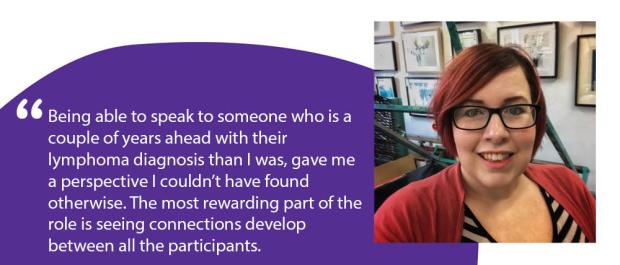
Having been diagnosed with peripheral T-cell non-Hodgkin lymphoma in 2016, I went on to have a donor stem cell transplant. I found great support in seeking out contact with a buddy through Lymphoma Action and that’s where my links with the charity began. Being able to speak to someone who is a couple of years ahead than I was at the time gave me a perspective I couldn't have found otherwise. I found reassurance and was able to talk to someone who had an understanding like no one else.
Coming into the role of a Live your Life facilitator was a perfect opportunity for me and I jumped at the chance to get involved. I thoroughly enjoy facilitating the workshops and I enjoy facilitating a space for people to meet others in similar circumstances and take control, navigating life beyond lymphoma. The most rewarding part of the role is seeing the connections develop between all of the participants during the day!
Peter Watts
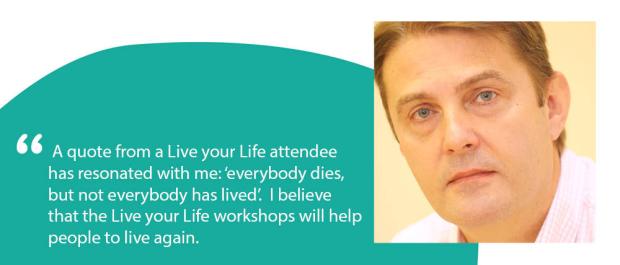
In the summer of 2000, I moved into a new house and was midway through my obligatory decoration from top to bottom. It was during one of these decorating sessions that I noticed a ‘golf ball’ sized lump in what I now know to be my ‘supraclavicular fossa’.
I was working in London at the time and when I returned to work my colleagues arranged for me to visit the company doctor who sent me for further tests. Quite quickly I was diagnosed with stage 11b Nodular sclerosing Hodgkin lymphoma. 6 months of chemotherapy then followed, with a cocktail of ABVD (Doxorubicin (Adriamycin®), Bleomycin, Vinblastine and Dacarbazine). Once my treatment had finished and I had been given the fantastic news of being in complete remission I made the decision to go self-employed. Live your Life workshops were being run when I had finished my treatment and being self-employed gave me the freedom to become a Live your Life facilitator. I am still working for myself delivering management development workshops, so running Live your Life workshops is a bit of a bus man’s holiday for me.
I have been involved with Lymphoma Action since 2013, being one of the founding members of the Upminster support group. A quote from a Live your Life attendee has resonated with me: ‘everybody dies, but not everybody has lived’. I believe that the Live your Life workshops will help people to live again.
Penny Clarke
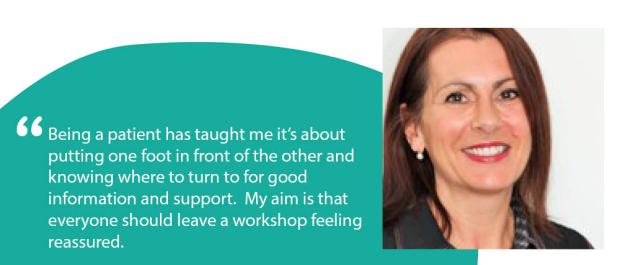
In Jan 2013 at the age of 50, I was diagnosed I with stage 4 follicular non-Hodgkin lymphoma and after 9 months of active monitoring (watch and wait) I started 6 cycles with bendamustine and rituximab (MabThera®) followed by two years of rituximab maintenance. I achieved an ‘excellent partial remission’ in 2016 which when I scanned again the following year, was found to be in complete remission. After 3 years, however, I relapsed with a single large tumour in my neck. This was subsequently treated successfully with a short course of radiotherapy.
Although I had many years of working in medical education and being around doctors, I still found it all very scary. Being a patient has taught me it’s about putting one foot in front of the other and knowing where to turn for good information and support. I’ve learned that there is life after a cancer diagnosis and it might even be better than before! I felt I wanted to give something back to others on their lymphoma journey so that is why I trained to be a Live your Life facilitator. As a facilitator I understand that people can feel very worried coming along to these workshops and my aim is that everyone should leave feeling reassured that they are not alone, they can find their way forward and have some new ideas about what they might do to help themselves or their loved ones in the future.
Simon Halladay
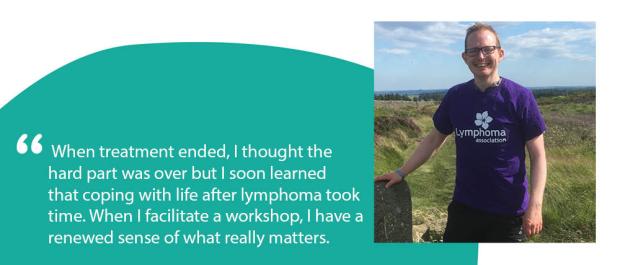
I was 27 when I was diagnosed with non-Hodgkin lymphoma in 2005. All plans for my wedding later that year had to go on hold whilst I underwent 6 months of R-Chop. When treatment ended and I was told that I was in remission, I thought the hard part was over but I soon learned that coping with life after lymphoma took time.
In 2017, I was looking for an opportunity to ‘give something back’ when I saw an advert for the Live your Life workshops on Facebook. Knowing how difficult it can be to move on following treatment, these workshops really appealed to me. At first, I was unsure whether the role was right for me as I’m not a teacher, trainer or facilitator by trade. Standing up in front of a room of people is not my idea of fun but I’m so glad I gave it a go. I have met some amazing people and facilitating workshops is really rewarding.
Each workshop is different, even though the content is the same. My favourite part is when we discover how lymphoma has affected everyone: the body language in the room changes as everyone relaxes and starts to ‘lean in’ as people describes what they’ve been through. Then, it’s no longer a room of strangers but 20 people going through a similar experience. It’s not often we get the chance to spend a day with others who ‘just get it’. I go home from the days tired and exhilarated, with a renewed sense of what really matters.
Gill Napier
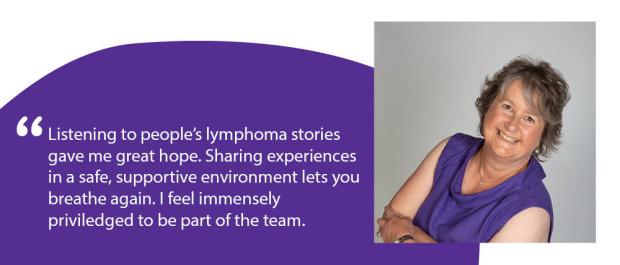
In September 2016, I returned to my job as a primary school teacher after the six week break. Within another six weeks, I was in hospital being treated for Stage 4 Follicular Lymphoma. No symptoms, only a niggling backache. Four sessions of R-CHOP later, I was blue lighted into hospital with septicaemia. Chemotherapy was stopped and three months of hospital in-patient intravenous antibiotics began. A reconstruction of my spine, two rods and eight screws later, a new bionic me emerged. My overwhelming feeling during this time was one of a total loss of control, very difficult for a teacher!
On release from hospital, there was a course of radiotherapy, and two years of Rituximab, finishing in February 2019. Since then, I have felt very well. Some fatigue, but I have regular check-ups, and have confidence in the system.
A turning point was attending a Lymphoma Action event in Newcastle in 2017. By now, I was over 60 and had retired and I was signposted to the ‘Live your Life’ workshops and the possibility of training as a facilitator. I’m a great believer in good coming from something bad, and if my experiences could help anyone, I was all for it. After attending a workshop as a participant, listening to people’s lymphoma stories gave me great hope. That is a recurring theme in the workshops which have been delivered. Sharing experiences in a safe, supportive environment lets you breathe again. The workshop content gives you confidence and a chance to take back some control. The opportunity to meet others in your area in a similar situation. I cannot recommend them enough, and I feel immensely privileged to be part of the team.
Lesley Rudd
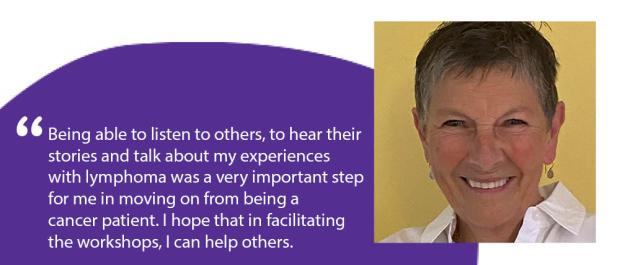
In 2017 I was diagnosed with stage 4 Nodal Marginal Zone Non-Hodgkin Lymphoma. For treatment I had 8 doses of RCVP over 5 months, and then went onto 2 years of Rituximab – a long haul but I am really well and, as they say, I am ‘Living My Life’!
Prior to retiring I was a nurse for years; as a lymphoma patient, whilst my nursing background helped me understand the words and the treatment, Lymphoma Action with all their knowledge, information and support were crucial in helping me find my post-treatment equilibrium. My Clinical Nurse Specialist directed me to a Live Your Life workshop early after my chemo, and I found both the facilitator and the other participants quite inspirational. Being able to listen to others, to hear their stories and to talk about myself and my experiences was a very important step for me in moving on from being a cancer patient. I hope that in facilitating the workshops I also can help people connect with others, assist participants understand a bit about life after diagnosis and treatment and how we can all live lives to the full.
Louise Horton
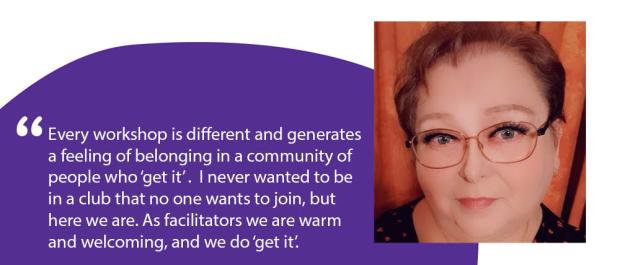
In August 2017 I was diagnosed with stage 3 Follicular Non-Hodgkin Lymphoma. Due to the ‘B’ symptoms that I was experiencing (especially the night sweats) my consultant recommended that I start treatment. I started my 6 cycles of Bendamustine and Rituximab. After the six months of treatment I decided not to have the further two years of Rituximab maintenance. My consultant was supportive and to be honest I could not have asked for a better haematology team. My consultant, clinical nurse specialists and the nursing teams were and remain fantastic. On my records it does state that I am ‘difficult to cannulate’. This caused quite a lot of amusement when I arrived for my chemotherapy and today, we still laugh about it. Humour has helped me a lot but isn’t for everyone. I have my six -monthly checks and still in remission.
I had read a few booklets about lymphoma, but a turning point was when I attended a local ‘Live your Life’ workshop with my mum. My fellow facilitator Peter was the lead and I was so inspired and informed about the work of Lymphoma Action and the information they have that I made the decision as soon as I left the session to volunteer and facilitate the workshops. Every workshop is different and generates a feeling of belonging in a community of people who ‘get it’. We all have individual experiences, emotions, support but being in the Lymphoma Action community helps me get through each day. I never wanted to be in a club that no one wants to join. But here we are and there are so many people who I have met who encourage and influence me every day. I joined the Facebook page and there are fantastic updates and suggestions to help us all cope with a lymphoma diagnosis. If you are feeling worried about attending a session, please do attend. As facilitators we are warm and welcoming, and we do ‘get it’.
Phil Parnham
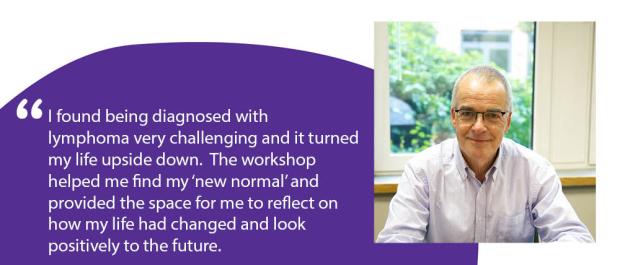
My name is Phil Parnham and just after my sixtieth birthday, I was diagnosed with large B- cell diffuse non-Hodgkin Lymphoma. After some initial complications, I started a series of 6 chemotherapy sessions (RCHOP) with the last one in December 2017. Following a clear PET scan in January 2018, the medical team told me I was in remission. After 3 years of regular check-ups I was finally ‘signed off’ in January 2021. Apart from the normal aches and pains for a person my age, I have remained well ever since.
I found being diagnosed with lymphoma very challenging. Although the medical team were brilliant, I had difficulty in coming to terms with what had happened and how it had turned my life upside down. After my course of chemo had finished, my wife and I managed to sign up for a face-to-face ‘Live your life’ workshop in Leeds (the pre-covid version). The workshop was brilliant and covered all the topics and issues we wanted to discuss but the best thing about the day was meeting the other participants. The group included a mixture of carers and those living with lymphoma, and it soon became clear that we were not the only ones going through this experience. We found the facilitators welcoming and the level of openness both comforting and supportive. The workshop helped me find my ‘new normal’ and provided the space for me to reflect on how my life has changed and look positively to the future.
Encouraged by this experience, I applied to become a volunteer for Lymphoma Action and after a rigorous training course, I became a facilitator on the ‘Live your life’ programme. Continuing my involvement with the workshops is both a privilege and an honour. It is wonderful working with the other facilitators, the Lymphoma Action team, and the knowledgeable specialist nurses, but the most rewarding part is meeting the other participants. Although the day can often start quietly, it is wonderful to see how the bonds within the group build throughout the day as we all share our experiences.
Jeff Chandra
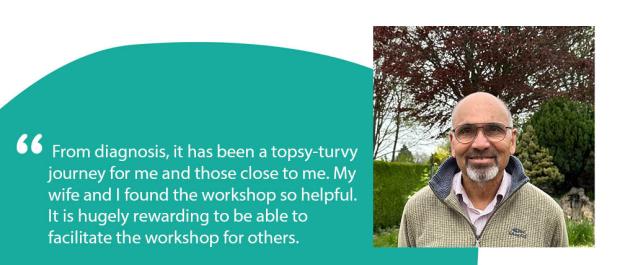
My follicular lymphoma diagnosis was an incidental finding after a scan, so it came as a bit of a shock when the consultant sat me down to take me through what it all meant. What came as a further shock was that, not only did I have a form of cancer, but that they were not going to treat it until I felt really unwell.
In reality, the active monitoring (watch and wait) with 6 monthly reviews lasted for nearly 5 years before I was treated with six cycles of bendamustine and rituximab. This was followed by 2 years of rituximab maintenance therapy which ended in 2020, and thankfully I have remained in remission to this day.
From diagnosis onwards, it has been a challenging and emotionally topsy-turvy journey for me and for those close to me. About halfway through, my wife Judy and I attended a Live your Life workshop. We found this so helpful, both in meeting and sharing experiences with others on the lymphoma pathway, but also in finding the information and support to create a positive future.
Once in remission, I applied to volunteer as a facilitator for the Live your Life programme and since then, I have taken part in a number of workshops with my fellow volunteer facilitators. Each one has been hugely rewarding for me personally, and the feedback suggests that those attending also value the open, engaging and informative style of these workshops.
